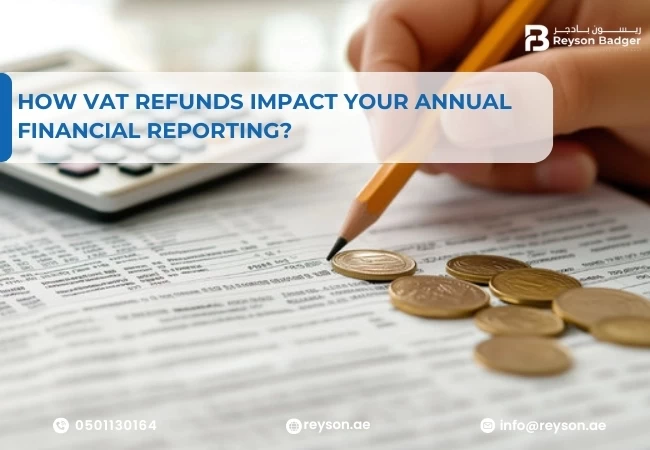How VAT Refunds Impact Your Annual Financial Reporting?
Written By Akshaya Ashok, Reviewed By Nouphal P C
Published on 20/11/2024

Recovery of the taxes incurred on legitimate business expenses by a company is an integral part of any tax strategy. However, VAT reclaim is not easy to report financially. Mistakes in accounting, delays in refunds, or a failure to obtain compliance may have more severe repercussions, impact financial performance and audits, and cause a loss of stakeholders' confidence. It is therefore important to see how matters of VAT refunds are significant enough as businesses maneuver the complex problems involved in VAT regulation. In light of this, the article discusses the critical considerations and best practices in dealing with VAT refunds, thereby ensuring correct financial reporting with minimum risks involved.
VAT Refund overview
Eligibility Requirements for VAT Refund
Businesses that wish to obtain a VAT refund must meet certain requirements, which would typically encompass the following
- VAT Registration: A business must be registered for VAT and considered a taxable person.
- Input Tax More Than Output Tax: This would encompass a scenario whereby more VAT was paid in consuming goods purchased than VAT collected on the sales of goods and services during the reporting period.
- Business Purpose: Goods or services that the refundable amount pertains to should be for business use only.
VAT Refund Types
There are so many forms of VAT refunds, including:
- Business Reclaims: Businesses pay more VAT on inputs than VAT collected on output.
- Tourist Reclaims: Refund VAT paid on purchases imported by non-residents when in a country, usually by some form of special reclaim scheme.
- Exports Refunds: Enterprises exporting their goods are also eligible to claim VAT refunds for inputs used in the manufacture of such goods.
Procedure and Timeline of VAT Refund Process
For most enterprises, claiming a VAT refund usually involves these steps:
- VAT Return Filing: a business has to file its VAT return claiming input tax eligible to be refunded
- Submission of Claim: in some jurisdictions claim submission form may be necessary.
- Processing Time: For instance, in UAE, the Federal Tax Authority intends to process refund claims within 20 business days and then issue the same amount in an additional 5 business days after approval.
Effects on Financial Statements
VAT refunds could increase the profit and loss statement by enhancing net income if claims of input tax are included in income. This would enhance profitability figures in the period that the refund is collected.
Impact on Balance Sheets (Assets, Liabilities, Equity)
- Assets: A successful VAT refund would increase current assets, either in accounts receivable or cash when the refund arrives.
- Liabilities: Payable VAT is reduced if it has previously been recorded.
- Equities: This is an indirect effect as it increases the retained earnings due to greater net income coming from recognized refunds.
Cash Flow Statements Impact
VAT refunds positively impact cash flow by complementing liquidity. Once businesses receive the refunds, cash flow from operations which the refunds can be reinvested back into the business or used in other expenses accrued is enhanced.
Accounting for VAT Refunds
- Recognition and Measurement Principles
VAT refunds must be recognized when it is probable the refund will arise and can be measured reliably. This tends to normally occur once the VAT return or refund claim has been submitted.
- Accounting Standards (IFRS, GAAP, etc.)
Both IFRS and GAAP require that firms adhere to the correct standards for revenue recognition and asset measurement. Specific guidance on each point differs by jurisdiction but essentially concerns the principles of recognizing an asset when future economic benefits are likely.
Disclosure Requirements
Firms disclose major accounting policies about VAT in their financial statements, such as:
- Nature of VAT transactions
- The treatment of recoveries of input tax.
- Any major estimates or judgments involved in the accounting for VAT.
Common Issues and Special Provision
- VAT Refund Timing vs Financial Reporting Timings
Companies generally face problems attributed to the difference between the refund claimed time and actual refund receipt due to timing differences in financial reporting.
- Foreign Exchange and Exchange Rates
An international transaction for a business means that a change in the rate of exchange will naturally affect the amount of VAT recovered in a foreign supplier or customer.
- Partial or Refused VAT Refund
Partial approval or denial of a claim based on failure to fulfill documentation requirements or eligibility criteria may create problems. Businesses should be ready to respond quickly in such circumstances.
Best Management Practices for VAT Refunds
- Periodic VAT Auditing and Review
Auditing every so often ensures that all transactions are on record correctly and that the refund claims are valid.
- Precise VAT Invoicing and Record-keeping
The accurate recording of all transactions, including invoices and receipts, is very important to validate refund claims.
- Submission of VAT Return on Time and Payment
Submission of returns within time limits will not allow the business to miss returns deadlines, which would make them lose eligibility for a refund.
Introducing VAT regulations to the training staff working in accounting and finance enhances compliance and effectiveness in filing claims.
- VAT Compliance Software and Technology
The implementation of modern technology software shall be adopted to develop and organize transactions and records that ensure claims are filed efficiently.
Industry-Specific Consequences
Manufacturing and Logistics
Due to the nature of activities, the manufacturing and logistics industries have distinct VAT implications:
- Recovery of Input Tax: Manufacturers should recover their input tax on raw materials and cost of production to manage cash flows efficiently. Such recoveries are only possible when proper documentation is made.
- Export Supplies: Generally, all supplies outside the GCC are zero-rated. Manufacturers can recover their input VAT on related costs. This will encourage exportation activities and increase competitiveness in cross-border markets.
- Complex Supply Chains: The taxation implications of VAT across more than one jurisdiction within logistics companies' operations, especially if international in reach, need to be understood to avoid compliance issues.
Retail and E-Commerce
Some of the most affected changes within retail and e-commerce are the VAT regulation changes, particularly with the growing need for online purchases.
- VAT Registration Obligations: A retailer is obligated to register for VAT if his/her sales exceed certain thresholds in different jurisdictions. In the EU, a threshold of € 10,000 applies for distance sales to consumers.
- Cross-Border Sales: When a business's cross-border sales exceed the distance selling threshold, e-commerce must also charge local VAT rates based on the location of the customer. Careful vigilance of cross-border sales is necessary to comply.
- Marketplace Obligations: In some cases, sellers may be relieved to have marketplace operators, like Amazon, collect and remit VAT, making it easier to comply but also subjecting them to enhanced scrutiny of the marketplace operators.
Financial Services and Banking
The financial sector poses distinct challenges in terms of VAT compliance.
- Exempt Services: Most of the financial services are VAT-exempt, which creates an obstacle to recovering input tax. Financial firms must accurately apportion the direct costs of exempt services and taxable operations to maximize recoverable input VAT.
- Compliance with Regulations: Banks and other financial institutions face a plethora of regulations to report and comply with VAT. Noncompliance can lead to serious penalties.
- Digital Services: With the ever-growing interest in the financing industry that is coming out of fintech and digital banking, knowledge of VAT implications for digital services has become all the more pertinent, especially in cross-border transactions.
Property and Construction
Real estate and construction have specific VAT-related issues:
- VAT on Sales Property: Generally, the sale of new construction property is liable for VAT. However, the sale of old properties may be exempt. Developers must exercise much caution while determining these rules to ensure compliance.
- Input Tax Recovery: Construction companies can recover VAT on materials used in projects. However, there needs to be significant record-keeping that can support their claims.
- Mixed-Use Development: If a property combines residential and commercial usage, it gets even more complicated for VAT treatment, as all the applications need careful consideration.
Conclusion
Accurate VAT refund accounting is vital for businesses operating in the GCC region. By understanding VAT regulations, accounting standards, and best practices, businesses can minimize risks and ensure compliance. To ensure timely refunds and avoid financial penalties, prioritize accurate VAT accounting. Consult Reyson Badger's expert VAT professionals for customized solutions and proactive support. Don't risk delayed or denied refunds contact Reyson Badger today to optimize your VAT refund process.

Written By
Akshaya Ashok
Akshaya Ashok is a content writer specializing in creating content focused on accounting and auditing. With over two years of experience, she has developed expertise in crafting professional content for the financial sector.

